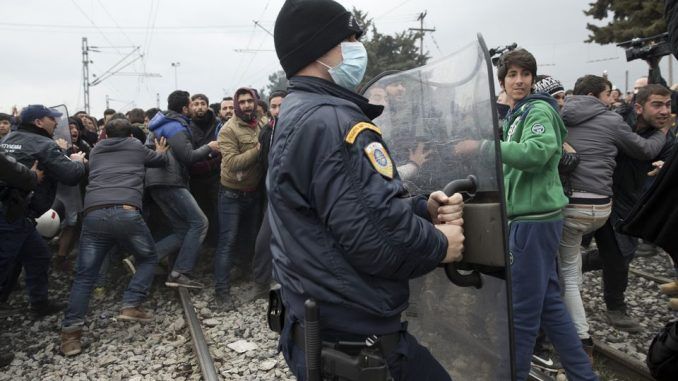
Over 6,500 migrants are stuck on the border between Greece and Macedonia after the the Former Yugoslav Republic of Macedonia’s (FYROM) reduced the number of refugees allowed to enter the country.
Macedonian police fired tear gas in order to restrain the migrants being held at the metal fence, as former Greek diplomat Leonidas Chrysanthopoulos urged Europe to help deal with what he says is a ‘humanitarian crisis’.
RT.com reports:

BYPASS THE CENSORS
Sign up to get unfiltered news delivered straight to your inbox.
You can unsubscribe any time. By subscribing you agree to our Terms of Use
RT: From your viewpoint does the current Greek crisis mark an apocalypse for the EU and the state itself?
Leonidas Chrysanthopoulos: Yes, it is interrelated. First of all, the current crisis of the refugees is creating a serious economic burden and a serious social burden on the country itself. The Greek government and the Greek people are doing everything possible to accommodate people that are coming into Greece from Turkey at the rate of about 3,000-4,000 a day. And of course we must take into consideration the Greek economic crisis that has been imposed upon the country by the lenders of the EU. This could be used as an excuse by the Greek government to cancel the memorandum of 2010 on the basis that a new situation has arisen by which we could no longer continue paying off these debts. There are other reasons to cancel that, which is the Vienna agreement on treaties of 1969 which anticipates reasons to cancel the memorandum such as blackmail, threats to the delegations, etc.
Peter Schulze, Professor of International Relations at the University of Goettingen said: “It is not only the volume, the scale and the speed of the migration moving on and wanting to go to Germany or to Denmark, or to Sweden, and their borders are already closed… The problem remains in the Balkan countries and especially in Greece. Greece is not able to handle the problem. Europe has to act in some way. And the only way they can act is to fortify and to protect the borders of Greece and to get a deal with Turkey…”
RT: We’ve heard a Euroskeptic stance throughout EU. Is there a possibility that major states would leave the EU and close or tighten their borders? (Macedonia has already tightened its border control.)
LC: We had this meeting that Austria had with the Balkan countries, where Greece was not invited. It was a meeting where it was decided to close the borders in FYROM to the refugees. Of course this agreement goes counter to what was agreed at the European summit last weekend. So, we have the police authorities of the Balkan countries plus Austria prevailing over the political decision taken by the heads of state, which is a contradiction. These moves also violate the Geneva agreements of 1951 on refugees, for which the EU is a signatory as well as FYROM.
fence is nearly broken!!! pic.twitter.com/YRofkMidCu
— Monika Kalinowska (@mkalinowskaa) February 29, 2016
…At this moment, there are 6,000 people [mainly Syrians and Iraqis, on the Greek side of the border]. Something must be done about that.
A theoretical solution that the Greek authorities could do is to carry these refugees by boat to member states of the EU and in this way help them to reach their destination. The Austrian Chancellor [Werner Faymann] [yesterday] said that Greece is acting as a travel agency, which is not true, because we are just trying to help these people, who are running away from a country that has been destroyed by war and by bombardments.
RT: Up to 70,000 migrants are expected to be trapped in Greece by next month, what will occur to the country if it decides to close its borders in order to prevent further flows to it?
LC: We have these refugees that are coming over from Turkey. Turkey is not doing anything to stop it in spite of the fact that it has assumed such obligations. There is a summit with the Turkish Prime Minister on March 7 where it is hoped that some kind of a practical solution can be [reached] with Turkey in order to prevent these refugees from coming by boat over to Greece. I personally doubt that anything will come out of this meeting. I hope I am wrong. But when we have such an amount of people coming in, it will create a serious problem to Greece, and Greece must find a way of sending them to other member-states of the EU, according to the summit decision of the EU…


star shooting. damn, are you all just going to let them completely overtake you?
star shooting. damn, are you all just going to let them completely overtake you?